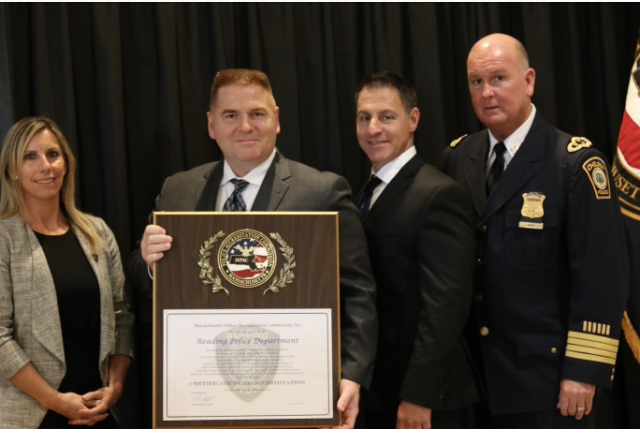
Left to right: Accreditation Manager Lt. Christine Amendola, Deputy Chief David Clark, Lt. Detective Richard Abate and Vice President of MPAC Chelsea Chief Brian Kyes. (Courtesy Photo Reading Police)
READING — Deputy Chief David Clark is pleased to announce that the Reading Police Department earned its re-accreditation from the Massachusetts Police Accreditation Commission (MPAC) today.
This is the second time the Reading Police Department has earned re-accreditation through MPAC. They first earned accreditation in 2013. MPAC recognized the department for its achievement during a ceremony at the Connors Center in Dover today.
The accreditation process is long and vigorous. It involves both an internal self-review and an external assessment by the Commission’s team of experts. The process is a self-initiated evaluation by which police departments strive to meet and maintain the top standards of law enforcement. It is considered the best measure for a police department to compare itself against the established best practices around the country and region.
Under the leadership of Accreditation Manager Lt. Christine Amendola, with assistance from Lt. Detective Richard Abate and Lt. Kevin Brown, the Reading Police Department was assessed earlier this year by a team of commission-appointed assessors. The Assessment Team found the department to be in compliance with all applicable standards for accreditation.
“Earning re-accreditation for the second time illustrates that the Reading Police Department continues to maintain the highest standards of policing,” Deputy Chief Clark said. “I want to commend Lt. Amendola for taking the lead on this process and thank Lt. Detective Abate, and Lt. Brown for their hard work. I’m extremely proud of everything we’ve accomplished this year, and earning re-accreditation is a testament to that.”
The MPAC program requires that departments meet all 257 of their mandatory standards and 60 percent of the 125 optional requirements. These carefully selected measures include Jurisdiction and Mutual Aid, Collection and Preservation of Evidence, Communications, Working Conditions, Crime Analysis, Community Involvement, Financial Management, Internal Affairs, Juvenile Operations, Patrol Administration, Public Information, Records, Traffic, Training, Drug Enforcement and Victim/Witness Assistance.
The Commission offers two program awards: certification and accreditation, with accreditation the higher of the two. Accreditation is granted for a period of three years. Participation in the program is strictly voluntary.
